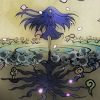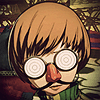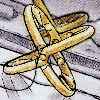| View previous topic :: View next topic |
| Author |
Message |
|
|
|
anime racket
Joined: 26 Apr 2011
Posts: 314
|
 Posted: Wed Mar 28, 2012 9:06 pm Posted: Wed Mar 28, 2012 9:06 pm
|
 |
|
|
This is a thread for discussing symbolism and metaphors in anime.
What do you think about them, do you think they add value to
a story or would the anime be better off without them, or did
you not even notice the symbolism to begin with?
I myself have a love-hate relationship with this trope in anime.
While I am attracted to and enjoy series that use heavy amounts
of symbolism, such as Evangelion and Utena, I actually would
prefer it if the stories were simpler as symbolism can obtusify
a story and make it harder to follow. Plus, the metaphors
can make otherwise charming scenes disturbing with fridge
horror.
|
| Back to top |
|
|
|
EricJ
 Joined: 03 Sep 2009
Joined: 03 Sep 2009
Posts: 876
|
 Posted: Wed Mar 28, 2012 11:45 pm Posted: Wed Mar 28, 2012 11:45 pm
|
 |
|
|
Or it could be something as simple as the crow that flies by cawing "A-ho, a-ho" after a character has an embarrassing moment.
|
| Back to top |
|
|
|
Br0m0n1028
 Joined: 25 Mar 2012
Joined: 25 Mar 2012
Posts: 4
|
 Posted: Wed Mar 28, 2012 11:46 pm Posted: Wed Mar 28, 2012 11:46 pm
|
 |
|
|
I personally love it when symbolism is included in anime. But, going off of what you said, only when its done to give artistic weight to a scene or concept rather then define a plot. Take Elfen Lied for example. Its so proflific in classic symbolism, archetypes, ect. but none of it is necessarily essential to the plot itself. It's just something on the side that gives a scene a deeper essence or emotion.
|
| Back to top |
|
|
|
Tris8
 Joined: 30 Oct 2009
Joined: 30 Oct 2009
Posts: 2114
Location: Where the rain is.
|
 Posted: Thu Mar 29, 2012 1:05 am Posted: Thu Mar 29, 2012 1:05 am
|
 |
|
|
Most of the anime shows that employ heavy symbolism wouldn't be the same without it. Like Bakemonogatari. That would be a completely different show (and a much duller one) without all its symbolism. Though some shows do go overboard. I thought Angel's Egg was so rapped up in trying to be deep, mysterious and meaningful that it forgot to tell a coherent and interesting story. I like symbolism in anime, but for me, less is more.
|
| Back to top |
|
|
|
DuskyPredator
 Joined: 10 Mar 2009
Joined: 10 Mar 2009
Posts: 15578
Location: Brisbane, Australia
|
 Posted: Thu Mar 29, 2012 3:39 am Posted: Thu Mar 29, 2012 3:39 am
|
 |
|
|
There can be quite a bit, one of the heaviest user I would say is the studio SHAFT. Shows like Bakemonogatari, Puella Magi Madoka Magica, Dance in the Vampire Bund, and Negima!? are so full of his symolism that they practically require being watched with"SHAFT goggles" (invisible goggles that can only be self made by watching a SHAFT anime), and don't just plan to just sit there and watch.
Then there is FLCL, thos who have seen this makes SHAFT look easy to understand, it almost seems maddeningly random, but you know that there hast to be symbolism. Like the syimple fact one character is like some sort of young lady that plays on sexuality, riding on a vespa and hitting people on the head with a guitar, which can cause you to grow a suspiciously shaped horn to grow, or a robot with a tv for a head looking like an angel. Gainax do seem to like to use it like say the feet and hands in TTGL.
Recent heavy user was Black Rock Shooter, still struggleing a bit with understanding the message, think I got it though. The show throws fights and enviroments and drama that you are not quite sure what you are suposed to be looking into.
|
| Back to top |
|
|
|
damien007
 Joined: 23 Jun 2010
Joined: 23 Jun 2010
Posts: 180
|
 Posted: Thu Mar 29, 2012 4:26 am Posted: Thu Mar 29, 2012 4:26 am
|
 |
|
|
How is symbolism a trope? That's like me saying characters and a plotline are tropes, they are basic story elements. I think the problem some people have with shows like Utena is that they try to take things that are symbolic and turn them into something more similar to reality. The problem is a lot of symbolism isn't meant to represent anything analogues to the real world. Instead it's often just meant represent a idea or vague concept; however a lot of people have trouble accepting this and try to force a realistic interpretation which ends in confusion and often doesn't make a lot of sense.
|
| Back to top |
|
|
|
|
dtm42
Joined: 05 Feb 2008
Posts: 14084
Location: currently stalking my waifu
|
 Posted: Thu Mar 29, 2012 4:59 am Posted: Thu Mar 29, 2012 4:59 am
|
 |
|
| damien007 wrote: | | How is symbolism a trope? That's like me saying characters and a plotline are tropes, they are basic story elements. I think the problem some people have with shows like Utena is that they try to take things that are symbolic and turn them into something more similar to reality. The problem is a lot of symbolism isn't meant to represent anything analogues to the real world. Instead it's often just meant represent a idea or vague concept; however a lot of people have trouble accepting this and try to force a realistic interpretation which ends in confusion and often doesn't make a lot of sense. |
LOL, you just accurately described those sad people who write lengthy dissertations about the symbolism in Neon Genesis Evangelion. Vague works which are parables or that have meaningless symbolism will always attract the deluded who think there must be a deeper meaning and who will see whatever they want to see.
|
| Back to top |
|
|
|
|
Svidrigailov
|
 Posted: Thu Mar 29, 2012 6:02 am Posted: Thu Mar 29, 2012 6:02 am
|
 |
|
|
Gilliam films provide a reasonable point of departure: what would Brazil or Baron von Munchausen be left with sans symbolism? Surely any work would be more immediately enjoyable--would they neglect symbolism--but it seems to me you've provided the antipode for E Unibus Pluram; inverting the valuation of commercial contra 'high' art (or rather maintaining popular valuation). In an interview on the prenominate essay, DFW says, "But now realize that TV and popular film and most kinds of "low" art - which just means art whose primary aim is to make money - is lucrative precisely because it recognizes that audiences prefer 100 percent pleasure to the reality that tends to be 49 percent pleasure and 51 percent pain. Whereas "serious" art, which is not primarily about getting money out of you, is more apt to make you uncomfortable, or to force you to work hard to access its pleasures, the same way that in real life true pleasure is usually a by-product of hard work and discomfort."
Keeping in mind the discursive nature of what 'order' a given work of art belongs to, a fair portion of the anime in question (symbolism-heavy) is at least some gradation of 'high' art. As such, we find obfuscation intrinsic to such work. Does this render all symbolic work categorically of the 'high' order, or imply a pertinent deeper meaning? No. There indeed exist series fitting dtm's description, and NGE may very well be one--it's certainly nothing to draft heady dissertations on (though as a cultural phenomenon or the dissemination of memetic influence via such shows would be a fecund line for a paper). There's the anecdote of a fan boasting to Anno about spending all his time and money on NGE, to which he replied, "You are a fool."
|
| Back to top |
|
|
|
damien007
 Joined: 23 Jun 2010
Joined: 23 Jun 2010
Posts: 180
|
 Posted: Thu Mar 29, 2012 6:26 am Posted: Thu Mar 29, 2012 6:26 am
|
 |
|
| dtm42 wrote: | | LOL, you just accurately described those sad people who write lengthy dissertations about the symbolism in Neon Genesis Evangelion. Vague works which are parables or that have meaningless symbolism will always attract the deluded who think there must be a deeper meaning and who will see whatever they want to see. |
I'm more referring to situations where people interpret symbolism too literally. Of course there are people who constantly look for deeper meaning where there isn't any. I love NGE but I agree it is a good example of a show that employs relatively superficial symbolism. However I do think some of the symbolism in NGE was good such as the tree of life in gendo's office which symbolises the path to the power of god. However that was probably the only real religious symbolism. I also loved Asukas back-story, especially her mother and the whole thing with the doll. If they don't make sure to cover that stuff in the movies I will be really disappointed.
Of course the final 2 episodes and the movie went allot further with the symbolism to the point it felt at times like they were forcing it(the live action sections in particular felt really gratuitous). The movie's ending is probably among my favourites, It finally reveals the meaning in the show's title and the final line I feel sick was actually very moving. The original final lines of the movie were meant to be "I'd never want to be killed by you of all men, absolutely not!" or "I'll never let you kill me.". I preferred the new version because it really summed up the whole feeling of the movie in one line.
I agree that allot of the symbolism (particularly the religious stuff) was very irrelevant and empty. However you would be silly to say that there wasn't a lot of good symbolism in there also.
[/spoiler]
|
| Back to top |
|
|
|
kaydub
 Joined: 28 Jul 2011
Joined: 28 Jul 2011
Posts: 318
Location: Cincinnati, OH
|
 Posted: Thu Mar 29, 2012 6:53 am Posted: Thu Mar 29, 2012 6:53 am
|
 |
|
|
I think most series utilize symbolism to an extent, it's one of those things that's just hard to avoid, especially in a hand-created (well, for the sake of argument) visual medium such as anime. Kenneth Burke once said, "humans are the symbol using animal," alluding to the fact that we are symbolic by nature and thus it would be natural for something that we create to express some form of symbolism.
As DuskyPredator mentioned, some studios use symbolism heavily in their titles and thus it is readily apparent, and I'd have to agree that anything from SHAFT is probably a perfect example. Additionally, any show that demands thinking on the part of the viewer is probably chock-full of symbolism.
I think the mecha genre as a whole is a prime example of symbolism. The mecha themselves are mega symbolic (I'll leave you to draw your own conclusions), but there are a lot of underlying themes in just about every mecha series that are rife with symbolism when you look at them carefully. Some try to be "smart" about it, such as Gundam, some try to provoke heavy thought and meaning like Evangelion and some just throw it in your face in a dramatic or ridiculous fashion like Gurren Lagann.
That being said, I don't always notice symbolism. I think sometimes that's a good thing, there was probably a ton of symbolism in Detroit Metal City but I probably wouldn't have enjoyed it so much if I had been focusing on the symbolism while watching it. Other times, I think it's a vital (maybe you could even say central) aspect of the work, such as in Ghost in the Shell or Paprika.
Whether or not it's a good thing is completely subjective in my opinion. A lot of times, it works. A lot more times, it doesn't. Everyone will draw different conclusions based on numerous subjective factors, so I don't think it is fair to say it is "good" or "bad". I know some people hated Bakemonogatari for its pretty much nonstop use of symbolism, others (like myself) ate it up and loved every minute of it. It really depends on the viewer's own likes and dislikes, as well as their expectations of the show. Some people really like to think about what their watching and analyze it and talk about it on forums, other people just like to watch and be entertained, symbolic meaning be damned.
|
| Back to top |
|
|
|
|
Svidrigailov
|
 Posted: Thu Mar 29, 2012 11:52 am Posted: Thu Mar 29, 2012 11:52 am
|
 |
|
|
Damien, I was particularly fond of the Eva (Eve) as mother, the entry plug being a surrogate womb and the 'absolute terror' field as the manifestation of maternal protective instincts. The issue with NGE is that without necessarily setting out to look for symbolism, certain aspects beg for analysis. For instance, when Unit 0 goes berserk, is this a rage at one's creator qua Paradise Lost, is it perhaps signifying a rape (the insertion of the entry plug without the Eva's consent). Or what about Rei? She's obviously modeled after Yui. Is Shinji's attraction to her and hatred of his father not demonstrating a textbook unresolved Oedipal complex? I've said before this series is psychological long before it's philosophical or even religious. Indeed the religious symbolism is topical, but the Freudian material is the foundation of the series.
Kaydub, symbolic is not the word I'd use for GITS. A Tachikoma holding copies of Lovelock's GAIA, Dawkins' Selfish Gene and explaining how the two fundamentally arrive at the same conclusion but on the macro and micro strata respectively is not symbolic. It's not symbolic if the 'symbolism' comes pre-wrapped with the pertinent exegesis; GITS tells you what they are refuting, contending, exploring, etc. Perhaps the Cartesian dualism isn't identified by name--though Descartes and La Mettrie certainly are in Innocence--but I hardly consider it concealed or even incognito. GITS also, pardon this lackluster pun, stands alone in its philosophical significance--the thing's damned near a thought experiment.
|
| Back to top |
|
|
|
damien007
 Joined: 23 Jun 2010
Joined: 23 Jun 2010
Posts: 180
|
 Posted: Thu Mar 29, 2012 8:43 pm Posted: Thu Mar 29, 2012 8:43 pm
|
 |
|
| Svidrigailov wrote: | |
Damien, I was particularly fond of the Eva (Eve) as mother, the entry plug being a surrogate womb and the 'absolute terror' field as the manifestation of maternal protective instincts. The issue with NGE is that without necessarily setting out to look for symbolism, certain aspects beg for analysis. For instance, when Unit 0 goes berserk, is this a rage at one's creator qua Paradise Lost, is it perhaps signifying a rape (the insertion of the entry plug without the Eva's consent). Or what about Rei? She's obviously modeled after Yui. Is Shinji's attraction to her and hatred of his father not demonstrating a textbook unresolved Oedipal complex? I've said before this series is psychological long before it's philosophical or even religious. Indeed the religious symbolism is topical, but the Freudian material is the foundation of the series.
Kaydub, symbolic is not the word I'd use for GITS. A Tachikoma holding copies of Lovelock's GAIA, Dawkins' Selfish Gene and explaining how the two fundamentally arrive at the same conclusion but on the macro and micro strata respectively is not symbolic. It's not symbolic if the 'symbolism' comes pre-wrapped with the pertinent exegesis; GITS tells you what they are refuting, contending, exploring, etc. Perhaps the Cartesian dualism isn't identified by name--though Descartes and La Mettrie certainly are in Innocence--but I hardly consider it concealed or even incognito. GITS also, pardon this lackluster pun, stands alone in its philosophical significance--the thing's damned near a thought experiment. |
Hmm that is an interesting perspective, I've just always viewed psychology and symbolism as separate and so didn't discuss those aspects in my post. However you could really call the AT-field a manifestation of maternal protective instincts. It's outright stated in the show that the AT-Field is a barrier that separates the egos all living beings from one another. The whole purpose of the human instrumentality project was to eliminate all those AT-Fields in order to merge to consciousness of all living beings. Calling it a manifestation of maternal instincts is a little out there, however given the scene with Asuka in the movie I can see how a person might get that idea. However I always felt her ability to manifest an AT-Field in that scene was more to do with her gaining full control of her consciousness then anything else. Calling the AT-Field her mother's way of protecting her, was more something she came up with in her own mind to help her come to terms her mother issues and thus by strengthening her ego she was able to manifest an AT-Field.
|
| Back to top |
|
|
|
|
Svidrigailov
|
 Posted: Thu Mar 29, 2012 9:13 pm Posted: Thu Mar 29, 2012 9:13 pm
|
 |
|
|
I'd like to discuss this further but would also prefer to avoid a lengthy tangent here, so would you mind if we continued this in the Evangelion Discussion thread? I'll post what we had so far.
|
| Back to top |
|
|
|
Lokarunith
 Joined: 30 Aug 2011
Joined: 30 Aug 2011
Posts: 30
Location: Portugal
|
 Posted: Fri May 25, 2012 12:23 pm Posted: Fri May 25, 2012 12:23 pm
|
 |
|
|
I have a question
Does anyone know what the Crow and the Butterfly mean in japanese culture?
I suspect that the crow represents the human soul. In Air (TV), Haibane Renmei and Haruki Murakami's novel Kafka on the Shore the crow is used to represent someone else who interacts with this world through the shape of a crow, like an avatar.
The butterfly seems to be related to dreams. xxxHolic, A Distant Neighbourhood, Boogieop Phantom and Nijigahara Holograph seem to use the butterfly as a symbol, however I'm not sure of what.
Last edited by Lokarunith on Fri Jun 08, 2012 9:30 am; edited 1 time in total
|
| Back to top |
|
|
|
Bento-Box
 Joined: 08 Sep 2009
Joined: 08 Sep 2009
Posts: 1049
Location: Florida
|
 Posted: Fri May 25, 2012 12:34 pm Posted: Fri May 25, 2012 12:34 pm
|
 |
|
|
I thought it had something to do with "transformations", the butterfly.
|
| Back to top |
|
|
|
|